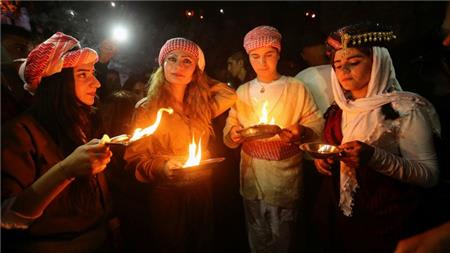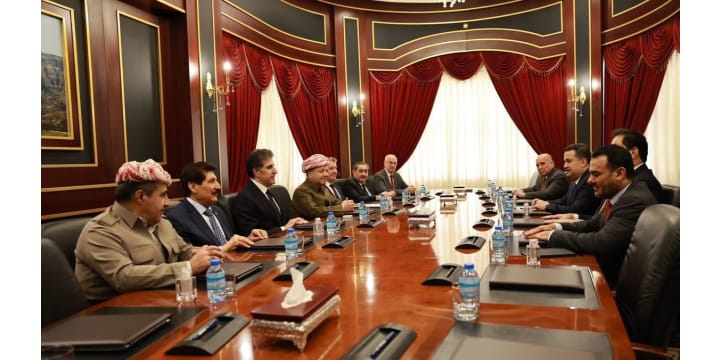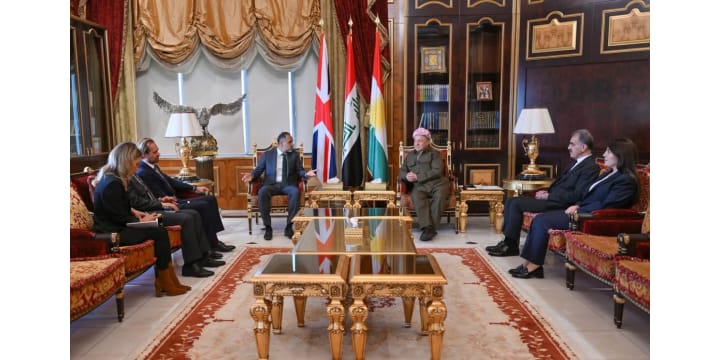
The religious and social ceremonies of Yazidis
The Yazidis have many festivals and special religious and social ceremonies that distinguish them from other religions and sects. The festivals for the Yazidis are often based on the Eastern or Solar calendar that precedes the Gregorian calendar by thirteen days and the holidays are divided into two parts, some of which take place in the regions where the Yazidis are inhabited and the others take place in the Holy Lalish Temple.
New Year's Day (Sar-Sal):
The Yazidis celebrate the New Year annually, and it is the first Wednesday of April of the Eastern calendar. Wednesday is the holy day for the Yazidis, in which the formation of the universe was completed and the soul settled in the mold of Adam on this day. It is one of the oldest and most meaningful holidays, as it symbolizes the renewal of life and nature with the beginning of Spring. The story of creation and formation appeared clearly among the ancient peoples of the Eastern Region, where they celebrated the coming of Spring and the return of fertility, such as the festival of Newruz, Akito, Zakmuk, and Red Wednesday.
This holiday is related to wonders of nature. It is called the Feast of Formation, where the white pearl exploded at the command of the Creator and formed from it the four elements: dust, water, air and fire. The universe froze and the land appeared, and this is what manifested in the process of boiling an egg, then cooling it and coloring the egg with the colors of nature on this day. It is called the Feast of Creation also when the first living being, "Adam" was created which has a symbolic significance of the beginning of life.
The celebrations begin with special religious ceremonies and rituals on Tuesday evening in the Lalish Temple with the participation of Baba Sheikh and senior clerics with the music of the Flute and Tambourine. 365 candles are lit in the sacred Lalish Valley seeking good and safety over the coming days, and announcing the start of the New Year.
And the women start boiling and painting the eggs, as the Yazidis believe that the egg symbolizes the universe according to their belief. They prepare a special type of breadcalled ‘Saok’which is mixed with cooking oil before it’s baked and distributed to the neighbors. On Wednesday morning the young boys and girls collect the red roses (anemones) from nature and put them with the colorful eggshells to be hung by the housewife above the doors with a little flour paste. And in the early morning, all family members wash their faces with drops of dew falling from the plants around them to bless them, as well as to put on new clothes, especially the children. In addition to cleaning the house and changing its furniture, and families offer sweets, nuts and eggs colored in natural colors.
The game of cracking eggs is the main game for this day, also the farmer visit their farms and sprinkle egg shells on the ground to increase the crops and be blessed.
There are other ceremonies, including the visit of women to the shrine of their dead, as well as ceremonies called ‘stikosh’ in which they break the shepherd's stick into small pieces and distribute them over the ladies milking the sheep to be blessed and get more milk.
It is worth noting that the Yazidis do not allow marriage in the month of April because April itself is the bride of the all months of the year. It is the most beautiful of them and it does not accept another bride, and also they do not plow the land in order to preserve the beauty of nature. In recognition of the importance of this holiday and the attention to religious and ethnic minorities in Kurdistan, the Kurdistan Regional Government decided to consider the first Wednesday of April New Year's Day (Sarsal) as an official holiday in all parts of Kurdistan annually.
Ezi Fasting feast ( Ezy means God):
The Ezi fasting feast falls on the first Friday of the Eastern month of December. This holiday is preceded by a three-day fasting, in which the Yazidis abstain from food and drink from morning until evening. Fasting is one of the ordinances of the Tariqa and a religious and moral obligation in which all Yazidis, male and female, adults and children over the age of fifteen, fast. It starts at five in the morning until dawn while abstaining from food, drink and offensive speech.
According to the Yazidi belief, light is good and darkness is evil. When they noticed that the sun began to recede, they prayed to the Creator to stop the decline of goodness and honor and appeal to the sun so that it would not be absent from them.
Yazidis wake up early on the morning of Eid and offer sacrifice as an offering to the sun. Their wear their new clothes, and pray to the Creator so that good may prevail over them and protect them from evils and woes. Women go visit the cemeteries of the dead, and the women distribute food to the poor, and at home sweets are presented. After each family congratulates its family members on the holiday, most of the men in the village gather at the village shrine and exchange congratulations on the holiday. Men and children in different groups visit each houses and you see smiles on their faces as if everyone is at a festival or wedding. Eid is an occasion in which hearts rejoice, souls are reassured, hatred is gone and intimacy and love increase.
*The remaining ceremonies will come in the next article.
Shamo Qasim
Head of the Cultural Department at Lalish Center

